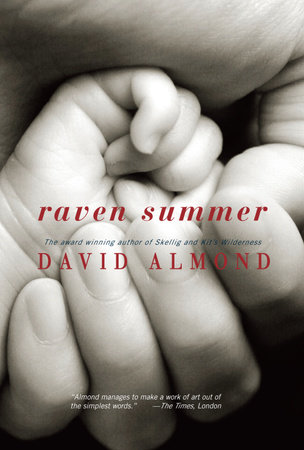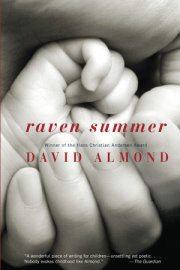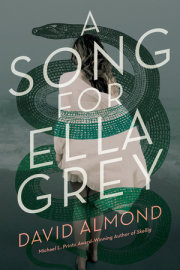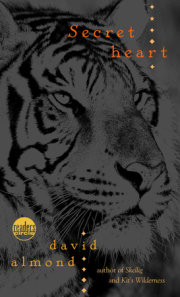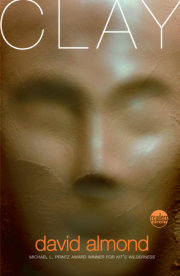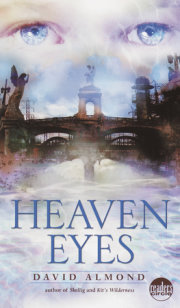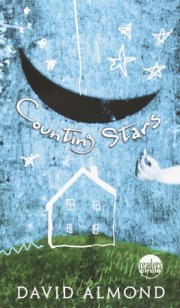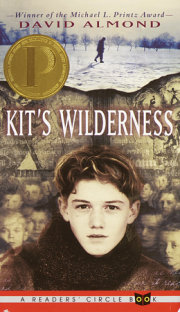1
It starts and ends with the knife. I find it in the garden. I'm with Max Woods. We're messing about, digging for treasure, like we did when we were little kids. As always there's nothing but stones and roots and dust and worms. Then there it is, just below the surface, a knife with a wooden handle in a leather sheath. I lever it out of the earth. The curved blade's all tarnished, the handle's filthy, the sheath's blackened and stiff and starting to rot away.
I laugh in triumph.
"Treasure at last!"
"Huh!" says Max. "It's just an old pruning knife."
"Course it's not! It's from the ancient Romans or the reivers. It's a weapon of war!"
I hold it up towards the sun.
"I name thee . . . Death Dealer!" I say.
Max mutters under his breath and rolls his eyes. I stab the knife into the earth to clean. I wipe it on the grass. I spit on it and rub it. I pick up a stone and try to sharpen it.
Then a bird flutters onto the grass six feet away.
"Hello, crow," I say.
"It's a raven, townie," says Max. He imitates its call. "Jak jak! Jak! Jak jak!"
The raven bounces, croaks back at him.
Jak jak! Jak jak!
"It's after the worms," says Max.
"No. It's seen something shiny! It's seen Roman gold! There, look!"
I dig like a maniac for a few daft moments. I stab the earth, plunge the knife deeper. Then my hand slips and blood's pouring out from my wrist. I scream, then laugh at myself and press my finger to the little wound.
Max mutters again.
"Sometimes I think you're crackers," he says.
"Me too," I say.
We lie in the grass and stare at the sky. It's early summer, hardly more than spring, but the sun's been pouring down for weeks. The ground's baked hard, the grass is already getting scorched. It'll be the hottest summer ever, and the story is they'll keep on getting hotter. The dust and soil's like a crust on my hands and arms. It mingles on my wrist with the dark red of drying blood, just like a painting or a map.
A low-flying jet thunders over us, then another, then _another.
"Begone, you beasts!" I call.
I flourish the knife at them as they streak away southwards over Hadrian's Wall, over the chapel of St. Michael and All Angels and out of sight.
Then my wound's bleeding again. I'll need a plaster. We get up and head for the house.
"It's all yours, Jack," I say.
I expect the bird to hop into the hole, but it doesn't. It flies over us and lands again six feet in front of us, looks at us, then flies a bit further on, lands, and looks at us again.
"You can tame them, you know," says Max.
"Aye?"
"Aye. We had one when I was a squirt. It was great-lived on the back path, begged for food at the door, perched on your wrist. Jak jak! Funnily enough, we called it Jack."
"What happened to it?"
"Joe Bolton shot it." He holds the air like he's holding a gun. "Kapow! He said it was trying to nest in his chimney. But I think he just wanted to kill something. Kapow!"
He waves his arms and runs at it and it flaps up into the sky.
"Go on! Get lost! Shoo!"
Inside the house, I find the plasters. I rub some of the dirt off the wound with a bit of kitchen towel, blot the trickling blood, then stick the plaster on. I clean more dirt off the knife blade. I wash it with soap. I sharpen it on the knife sharpener on the kitchen wall. I spray furniture polish on the handle and wipe it. I spray the sheath as well, and I bend it and run it between my fingers and straightaway it starts softening. I smile.
"Very nice," I say.
I loop my belt through the sheath and the knife sits there at my hip.
"What d'you think?" I say.
"I think you'll get arrested," he says. "It's against the law."
I laugh.
"A pruning knife? Against the law?"
I tug my T-shirt over it, hiding it.
"OK now?" I say.
I get some bread and cheese and lemonade and we sit on the bench at the back door. The raven's on the gatepost now.
Jak jak! Jak jak!
It stabs its beak towards us. It flutters its wings, it bounces and bobs.
"What do you want?" I laugh.
Jak jak! Jak jak!
A printer whirrs upstairs. Dad, hard at work as usual. We look up, towards his open window.
"What's he writing now?" says Max.
"Dunno. He tells nobody nothing till it's finished."
We chew and listen.
"Weird," says Max.
I swig the lemonade, swipe my wrist across my lips.
"Aye. Sometimes it's like having a ghost in the house. Come on. Let's head out, eh?"
So we leave the garden.
2
We get onto the footpath that skirts the house, then head along the long potholed lane towards the village. There's a single hiker in a red cap moving ahead of us. There's kids on the field beside the village school. Somebody's screaming, like they're getting lumps kicked out of them. Then there's a cheer and a howl of laughter, and a bunch of them break away and belt uphill towards Great Elm.
"Want to join in?" I say.
"Mebbe," says Max.
Gordon Nattrass appears at the edge of the field. He watches us from the fence, then he jumps over it and comes towards us. He's carrying a rusty saw in his hand.
"Hello, brothers," he says.
Brothers. It's what he always says.
"What you up to, brothers? Where you off to, brothers?"
"Nowt," says Max.
"Nowhere," I say.
"What you up to?" I say.
He grins.
"Fun and games," he says. "Come on over, eh?"
Another jet screams over us and streaks away towards the east.
"Bomb them back to the Stone Age!" yells Nattrass, then he spits. "Come on," he says.
I'm about to go with him, but Max holds back.
"Mebbe later," he says.
I look at Max. I look at Nattrass. Nattrass and I were friends when we were small. We did the blood brothers thing one day, cutting our thumbs, then pressing the wounds together and letting our blood flow into each other. I touch the knife at my hip as I remember it. But it was ages back. After that he started changing, started becoming the Nattrass we know today.
He winks at me.
"OK, brother," he says. "Later, then. I'll look out for you."
He rests the saw blade at the side of his neck, then drags it back like he's going to saw his head off. He laughs, runs back to the field, and soon there's more screaming.
"I hate that bastard," says Max.
"Me too," I say.
Copyright © 2009 by David Almond. All rights reserved. No part of this excerpt may be reproduced or reprinted without permission in writing from the publisher.

